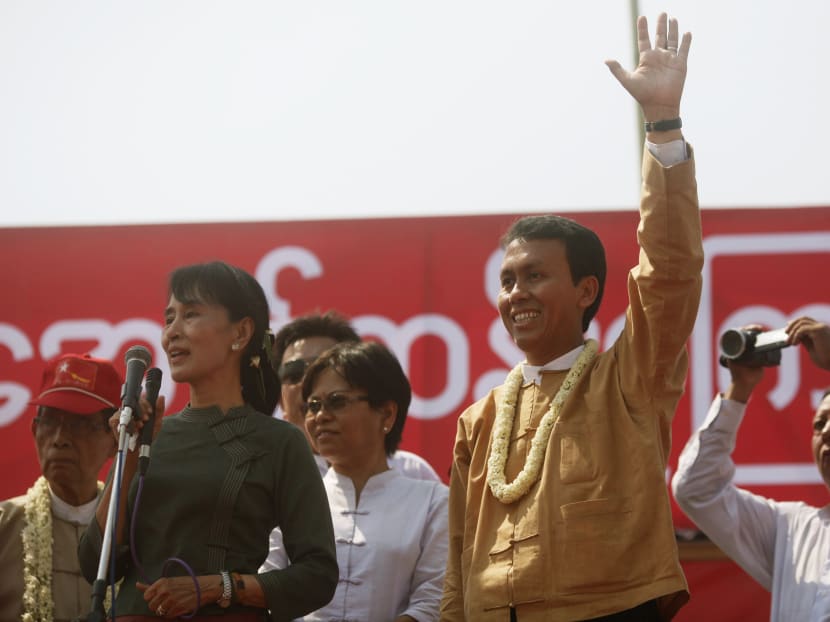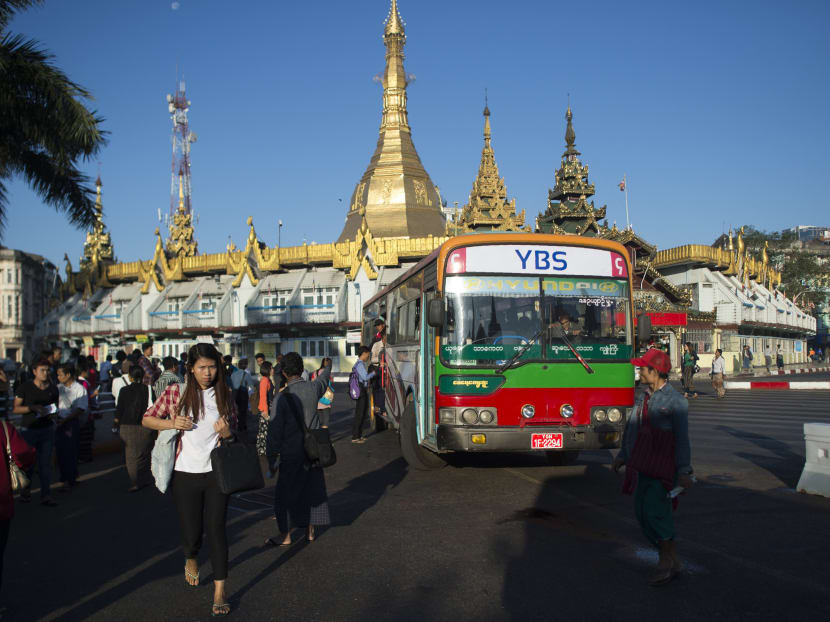‘Prison made me mature’: meet Suu Kyi’s man in Yangon
YANGON — Naypyidaw has been Myanmar’s capital for 11 years. But it is Yangon, this vibrant port city 320km to the south, with its traffic-clogged streets and fading colonial splendour, that remains the country’s commercial centre.


YANGON — Naypyidaw has been Myanmar’s capital for 11 years. But it is Yangon, this vibrant port city 320km to the south, with its traffic-clogged streets and fading colonial splendour, that remains the country’s commercial centre.
As Ms Aung San Suu Kyi and her National League for Democracy (NLD) mark their first year in power, it is clear that the dynamic business hub will also hold the key to any future success.
With a population of 7.36 million (the Yangon region extends beyond the city proper) and almost a quarter of the nation’s GDP, political and economic reforms have to work in the city if they are to take root across the nation of 52 million.
As such, much rests on the shoulders of the Chief Minister in the city, Mr Phyo Min Thein.
Like Ms Suu Kyi, the nation’s de facto leader, Mr Phyo Min Thein was a political prisoner, having served 15 years behind bars.
A former physics student and activist at the University of Yangon, Mr Phyo Min Thein was in his 20s when he was jailed in 1991, after the 1988 uprising against the country’s military junta.
He is remarkably sanguine about his time in prison.
“The experience made me a more mature person,” he said. “Two things kept me going: The first was … my admiration for Aung San Suu Kyi; the second was the Buddhist religion. Practising Buddhism helped us a lot in these difficult times.”
SWIFT RISE
Mr Phyo Min Thein only joined the NLD in 2012. It was a shrewd move as he was picked to contest the dramatic by-elections of that year.
He ascended rapidly in the NLD, reportedly acting as a key strategist during the crucial 2015 elections that followed.
He regards Ms Suu Kyi as a mentor. “When I was in Parliament, Aung San Suu Kyi taught us a lot. She taught us that politicians must be willing to learn. That we should be optimistic, patient and systematic … I see her as a mother,” he said.
Patience is what he needs in Yangon. His first year in office has been tough.
One of his signature initiatives, the Yangon Bus Service (YBS) launched earlier this year, has been broadly criticised. What started as a bold attempt to streamline public transport in the city has left commuters frustrated by increased fares, long delays and irregular services.
A Facebook video marking Mr Phyo Min Thein’s first year in office, which claimed the YBS as an achievement, was removed after being panned.
He notes that he and the NLD are battling against the effects of decades of systematic neglect, corruption and abuse of power.
“I don’t see (the YBS) as a major problem,” he said. “We’re taking things step by step. With any reform, there are bound to be challenges, whether political or from vested interests.”
Many voters understand this and remain supportive.
Indeed, the local Muslim community, while wary of the extremist rhetoric emanating from Buddhist hardliners and possible fallout from violence in Rakhine state, feel that forces in the military are deliberately stirring up resentment.
On May 9 nationalist monks led a mob into the predominantly Muslim Mingalar Taung Nyunt township, seeking “illegal Rohingya”.
The situation quickly escalated and the police fired warning shots.
“The incident was caused by instigators,” the Chief Minister said. “We will take legal action (against them). The law enforcement agencies have already started.”
On May 12 the police issued several arrest warrants over the attacks.
Mr Phyo Min Thein’s explanation of the turmoil in Rakhine is very much in alignment with Ms Suu Kyi’s. But he speaks with greater empathy, in contrast with Ms Suu Kyi’s stand-offish demeanour.
He prefaced his argument by holding up Myanmar’s diversity. “There is freedom of religion in Myanmar,” he said. “There is a Bengali mosque, a church and a Hindu temple near the Sule Pagoda (in downtown Yangon).
“(The conflict in) Rakhine state is not about religion. While the Rohingya are not among Myanmar’s 135 recognised ethnic groups, there is the Kamein people who are predominantly Muslim. This proves that the problem in Rakhine is not about religion, but ethnicity.”
“We are trying to build a country where all religions are equal. This is part of democracy, human rights and maturity,” he said.
ECONOMIC POWERHOUSE
Mr Phyo Min Thein claims big ambitions for Yangon, which has an unemployment rate of 4.1 per cent and a poverty rate of 40 per cent, even as real estate prices climb.
“Our vision for Yangon is for it to maintain its heritage, to become a green city and an economic powerhouse, where investors would want to come and stay,” he said.
Despite criticisms from business leaders that the NLD lacks practical experience, the Chief Minister has drawn praise for his low-key, problem-solving approach.
He said: “Foreign investment will bring in job opportunities and technology transfers. If we can create lots of new job opportunities in Yangon, we could confront the homelessness problem.”
He certainly has his work cut out. With more than half a million homeless, Yangon remains restive and volatile.
At the same time, those opposed to Ms Suu Kyi and the NLD are deeply entrenched in the city’s fabric, especially among the business elite. There will be parliamentary elections in 2020.
But if over the next few years Mr Phyo Min Thein can navigate the vested interests, resolve the city’s public transport woes, pull in investors, create jobs and curb the tendency to lawlessness, both he and the NLD will be big winners. SOUTH CHINA MORNING POST






